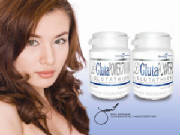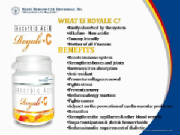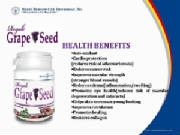|


Do you know that Glutathione is naturally produced by the liver? And that it is a potent anti-oxidant
helping to boost our body's immune system while at the same time whitening our skin? And that because of its chemical
structure it has the capability of converting eumelanin (dark/brown/yellow
pigmentation) to phaeomelanin (reddish white pigmentation) in our skin giving us a fairer
skin? Know more why we need to supplement our body's need for Glutathione from the following report .....
Glutathione and Aging
The easiest surest way (to live an extra decade or two): "Increase your body's supply of glutathione."
Dr. David Williams
Low glutathione levels are a primary risk factor for most degenerative diseases.
Your risk of having low glutathione sharply increases when you:
People who live long almost always have high glutathione levels. If glutathione levels are low, the scientific evidence
is conclusive: you will experience more disease and die sooner. A research study on people 60+ show that a 20%
higher level of glutathione resulted in 1/3 less disease in the studied population.
In today's environment of high toxins and high stress, you cannot afford to leave to chance the levels of glutathione
within your body.
Glutathione and Science
The importance of glutathione is well documented by medical research. As a product naturally produced by the body, it plays a multitude of critical, well documented roles in maintaining the health of the body. Unfortunately it's importance is still largely ignored by the medical community. Solid science exists
identifying low glutathione levels as a primary factor triggering the degeneration that leads to most major degenerative diseases
(Over 77,000 medical research articles are published about glutathione)
Missing Science: Little effort has been focused on researching whether higher glutathione levels
can restore health lost through the lack of adequate glutathione. For example tests have been conducted on mice showing that
a drop in glutathione will cause high blood pressure within 2 weeks. Yet I could not find research showing whether or not
increased glutathione could reverse high blood pressure.
What is clear is that low glutathione levels play a major role in creating degenerative disease.
With recent research (Double blind studies have documented an average 292% increases in glutathione being achieved within
2 months thorough a nutritional product that became available in 2007) showing a validated way of improving glutathione levels,
research is starting to emerge identifying it's benefits to people suffering from various degenerative disease.
How can it affect my health?
Glutathione is produced by the body and plays a role in your health as important as that of blood. If you run too low on
glutathione you will die. Unfortunately many doctors do not even know that it exists. Individuals who have low
levels of glutathione are susceptible to chronic illness.
Decreased levels of glutathione can be brought about by continual stress upon the immune system, poor food, low sleep,
toxins in your body etc. As we now know, a lowered immune system can bring about illness and disease. This is a ferocious
cycle. While you need glutathione for a productive immune system, a weakened immune system hampers the production
of glutathione.
"No other antioxidant is as important to overall health as glutathione. It is the regenerator of immune cells and the most
valuable detoxifying agent in the body. Low levels are associated with early aging and even death." The Immune System Cure,
Lorna R. Vanderhaeghe & Patrick J.D. Bouic, Ph.D

Do you know that our body cells are like hollow blocks that are being held together by collagen which
serves like cement? And that Vitamin C makes collagen. So without collagen the body cells will crumple apart, bones and teeth
will creak and skin will sag and wither as a sorrowful consequence and thus making one grow older untimely. Read about
the following amazing reports about Vitamin C by Dr. Al Sears:
Dear Health Conscious Reader,
I’m sure you know vitamin C is good for you. That it can help clear out your arteries,
fight inflammation, help fight sicknesses like the cold, and that it’s even good for your skin.
But what you might not know is that right now, your body is working as fast as it can to destroy
almost every bit of it.
That’s because your body doesn’t just use it … it uses up
vitamin C to make collagen, the most abundant protein in your body. Collagen is the basis for your skin, bones, teeth,
blood vessels, eyes, heart … essentially all parts of your body.
Collagen is stronger than steel wire, and as part of a network of an elastic-like
substance called elastin, it makes up the connective tissue that holds you together.
That means that without vitamin C to make collagen, you would literally fall apart.
Your joints would fail, your blood vessels would break open, your gums would ulcerate,
your teeth would fall out, and your immune system would fail, too.
All because of a lack of vitamin C.
In fact, they have a name for it when that happens. A disease called scurvy.
Scurvy is not something you see very much today because we know that vitamin C
is important. You usually get the bare minimum of vitamin C through what you eat so that you don’t end up with a dietary
deficiency.
In fact, that’s really all the U.S. Recommended Daily Allowance is meant
to prevent – a dietary deficiency of a nutrient. What the RDA doesn’t do is recommend how much of a nutrient
you need so you can function at your best.
For example, the RDA of vitamin C for adults is 90 mg for men and 75 mg for women.
Meanwhile, most animals can make their own vitamin C, and based on what they produce,
your body would make between 3,000 mg and 10,000 mg a day if it could – over 100 times more than the RDA!
But your body can’t make vitamin C. The problem is, your body is still making
collagen, and it needs lots of vitamin C to make all that connective tissue that keeps you moving without pain or discomfort.
The joints in your body that can move are called synovial joints and the connective
tissue that holds them together and lubricates your cartilage is called synovial fluid.
This thick, straw-colored liquid is made up mostly of collagen, but also blood
plasma, hyaluronic acid and some other proteins. Synovial fluid isn’t just a lubricant, though. It’s also antibacterial,
and your body uses it to fend off diseases like arthritis.
As you age, things like strain, wear and tear, injury and even reactions to medications
can let pollutants in to your joints, and synovial fluid can leak out. The combination can cause serious pain and inflammation
on a daily basis.
I play tennis every day, so I need to keep my synovial joints like my knees, elbows,
wrists and ankles all moving well.
Here’s what I do to reduce inflammation and keep my synovial fluid healthy
for less pain and irritation. And you can do it, too:
1. Take enough vitamin
C. Normally, you wouldn’t think of vitamin C for joint health, but because it’s used to make collagen,
the building block of all your joints and connective tissue, you need to make sure you get enough through food or supplements
every day.
Of course berries and oranges
have a lot of vitamin C, but bell peppers, collard greens and papaya all have lots of vitamin C, too.
A little-known source of vitamin C is peppermint
leaves. You can make peppermint tea – just make sure to cover the mug while brewing to keep in the oils. You can also
freeze it to make iced peppermint tea during the summer. Or you can toss the leaves into a salad, or add some to your salad
dressing oil.
Based on my own experience,
I recommend 3,000 mg of vitamin C per day if you’re currently in good health. This will give you enough to produce the
collagen required for joint health, strong blood vessels and heart disease prevention.
Pregnant women should get
at least 6,000 mg per day – and in times of stress or sickness, you can take up to 20,000 mg. A powdered form may be
more convenient for larger doses.
2. Take other joint-supporting nutrients.
-
Glucosamine really packs a
punch. This amino sugar is known to help repair damaged cartilage, reduce inflammation and help stop cartilage deterioration.
In fact, a study in the British Journal of Sports Medicine found that glucosamine helped completely relieve the joint
pain of 80 percent of its participants, and 70 percent had improved joint mobility. I recommend you take 500 mg of glucosamine
twice a day with food, as a few of my patients have reported stomach upset if they took it on an empty stomach.
-
Just 55 micrograms of selenium
a day can help reduce your chances of osteoporosis (a disease in your bones that can make you more vulnerable to fractures)
by up to 15 percent. And researchers have shown there is a direct correlation between the amount of this powerful mineral
in your body and joint problems. The best source of selenium is found in Brazil nuts. They pack a whopping 544 micrograms
in just 1 ounce. You can also get selenium from red meat, tuna, eggs and walnuts.
-
D-Glucuronic Acid helps keep
inflammation down and is one of the main components of hyaluronic acid, a building block of synovial fluid. You can take 250
mg twice a day if you already have joint pain, and after one week, reduce it to 250 mg per day.
3. Maintain a healthy
weight. If you’ve got a few excess pounds, you might think you’re in a catch-22 … your joints hurt
so you can’t exercise, and when you exercise it makes your joints hurt. But, excess weight can cause severe pressure
on joints like your knees. Nearly six times your entire body weight is exerted on your knees when you walk,2
so the more you weigh, the more joint problems can occur.
That’s why I don’t
recommend high-impact exercise which can put more strain on your joints and your synovial membranes. But I do recommend high-intensity,
short-duration, progressively challenging exercises like I show you in my PACE program.
With PACE, you can melt fat
faster, with little impact. The best part for your joints is that exercise helps your body with synovial fluid production,3 keeping your joints moving smoothly.
4. Get your essential
fatty acids. Omega-3s are produced from linolenic acid, and you get omega-6s from linoleic acid. They are crucial
to joint health because having the right balance of them helps you avoid inflammation. But your body can’t create them.
I recommend you get 2 to 5 grams of omega-3 each day, and as always, I recommend you get your nutrients through food.
You probably know that eggs,
red meat and avocados have omega-3. And a quarter cup of walnuts can have over 2 grams. But two other sources you may not
know about are navy and kidney beans, and winter squash. Beans can have up to a gram per cup, and winter squash has 300 mg
of omega-3 per cup.
If you can’t get essential
fatty acids through what you eat, try Sacha Inchi oil. One tablespoon has 6.85 grams of linolenic acid, and 5.15 grams of
linoleic acid.
You could also use cod liver
oil, which is packed with omega-3s. Almost 900 milligrams per teaspoon.
5. Take a daily dose of gelatin. Gelatin,
which is normally used in cooking, contains collagen. So does your cartilage. It’s widely used in Europe to help treat
arthritis and assist in rebuilding cartilage damaged from strenuous sporting activities. In fact, studies done in Germany
show how hydrolyzed gelatin can be used to treat joint conditions and help relieve pain, inflammation and stiffness of your
joints. Gelatin can be used in all kinds of forms, but I suggest unflavored natural gelatin (7-10 grams a day is ideal).
To Your Good Health,

Al Sears, MD

Why grape seed is a vital dietary supplement?
Grape seed is also known as Vitis vinifera.
Grape seed has been used as a dietary source of essential fatty acids and tocopherols and as an antioxidant.
Grape seed had been used for its liver protective effects, to improve circulation (including conditions such as varicose veins,
bruising, swelling, and decreased vision), and to improve skin tone and elasticity.
The use of grape seed in cultural and traditional settings may differ from concepts accepted by current Western
medicine. When considering the use of herbal supplements, consultation with a primary health care professional is advisable.
Additionally, consultation with a practitioner trained in the uses of herbal/health supplements may be beneficial, and coordination
of treatment among all health care providers involved may be advantageous.
All Royale Brand Products are fully licensed and certified for export and distribution to other countries.
SEE OUR PRODUCTS BY CLICKING BELOW:
Click here NOW.....Downloading takes some time. Please have patience!!! When downloading is finished, scroll down to view
each products. Click Return (Back Arrow) when done.
How safe are our products? These products are totally safe. Legal documents and certifications
are available to support this: SEC, DTI, BIR, BFAD, PIPAC and Halal ( Islamic Approval).
Click here to download legal documents and certifications. Click Return (Back Arrow) when done.
Minmum order should be at least USD 300 worth of any items. To put your order, kindly fill up
inquiry form below.
Enquiry form:
TO START VIEWING THE PRODUCTS, CLICK THE "BUY NOW" BUTTON
BELOW:
|

